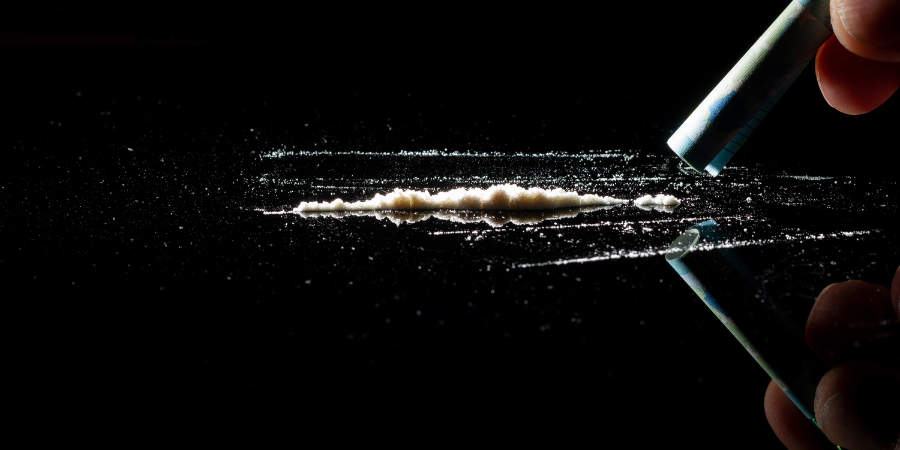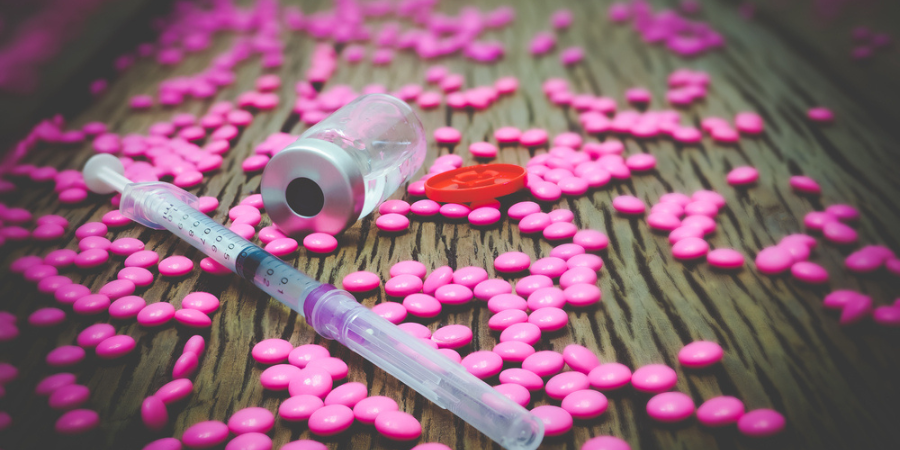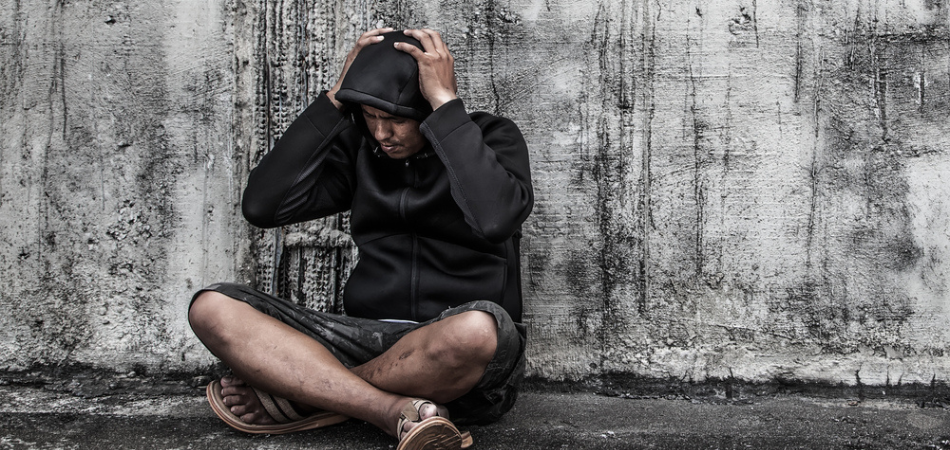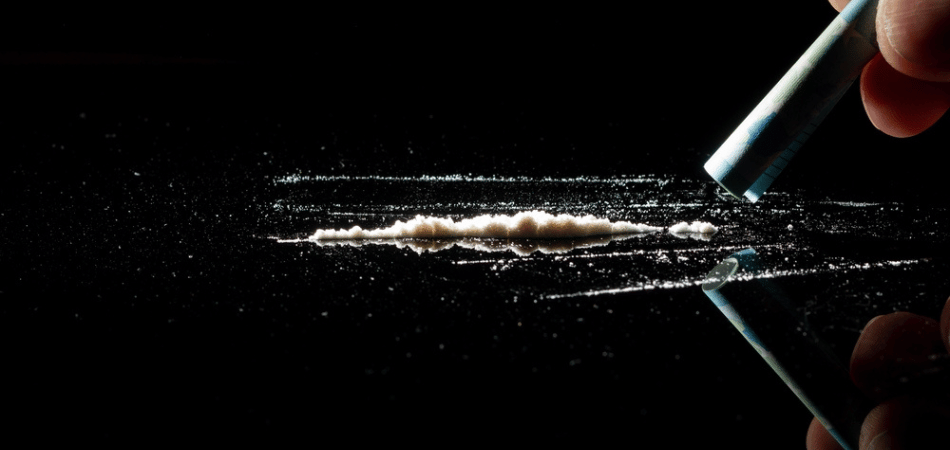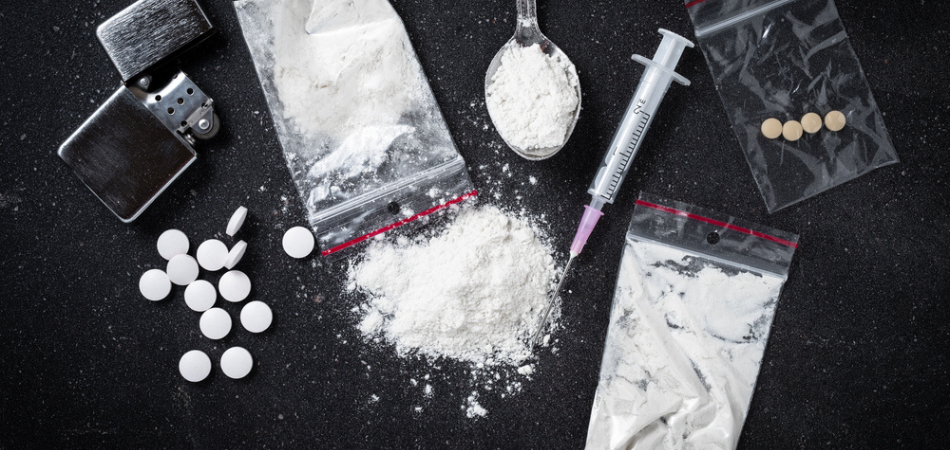
Written by:

Medically Reviewed by:
Last Updated:
October 13th, 2025
Cocaine detox and withdrawal
Every year, thousands of people in the UK struggle with cocaine addiction, but behind every statistic is someone whose life has been disrupted by cravings, health risks, and fractured relationships. If this feels familiar, you’re not alone. Cocaine detox is the first step in breaking free from addiction. Done safely and with the right support, detox can help you manage withdrawal, reduce risks, and open the door to lasting recovery.

What is cocaine detox?
Think of cocaine detox as giving your body a reset. It is when you stop taking cocaine and allow your system to flush it out, giving your brain and body the chance to start finding balance again. This is always the first step of recovery, because before you can deal with the “why” of addiction, you have to deal with the long-term physical effects of cocaine itself.
When you use cocaine regularly, your brain gets tricked into thinking it needs cocaine to feel good or to do its job. Once you stop, your brain has to relearn how to function without it, and that causes a reaction called “cocaine withdrawal”. This triggers a host of unpleasant symptoms, which often cause a relapse even in people desperate to stop.
Detoxing from drugs such as cocaine means allowing your body time to clear the drug and begin recovering. However, going through detox under medical observation is a safer and far more effective approach. At UKAT, we provide medical detox programmes within our centres, led by experienced teams of doctors, psychiatrists, nurses, therapists and support staff. Their combined expertise ensures that your detox is managed safely, with the right care to reduce risks and make the process as comfortable as possible.
Each UKAT cocaine detox centre offers slightly different levels of support, so get in touch with us and we can match you with the most suitable one.
How to detox your body safely from cocaine?
No two people react to cocaine withdrawal in exactly the same way, which is why at UKAT, you’ll receive an assessment to establish:
- The levels, duration and frequency of your cocaine use
- Whether you have also been drinking heavily or using other drugs too
- Any attempts to quit cocaine before
- If you have particular physical or mental health issues which need support during detox
From there, your detox will begin with full support around you. Because UKAT provides inpatient cocaine detox, you will live in one of our centres so we can take care of the basics, like preparing your meals, keeping you hydrated and adjusting your plan if your symptoms change. If cocaine withdrawal symptoms become particularly tough, medication can sometimes be prescribed to help.
While the first days can be uncomfortable, they pass more quickly than many people expect. Once you’re ready, rehab therapy begins right away, so there is no gap where you are left vulnerable to relapse.

What are the benefits of cocaine detox?
Cocaine detox is applied at the start of the treatment pathway, during the primary care programme, and can bring life-changing benefits, especially as the first stage in a complete rehab treatment plan. The best thing is, the sooner you begin detox, the sooner you will see how much better your life is without cocaine. Some of the most important benefits include:
- Improved physical and mental health: Cocaine use puts huge pressure on your heart and blood vessels, raising the risk of heart attacks, strokes and seizures. It can also cause paranoia, depression, severe anxiety and even suicidal thoughts. Cocaine detox gives your body and mind the chance to recover and lowers the danger of life-threatening emergencies.
- A calmer, happier life: Cocaine abuse can negatively impact your job, education, finances and every other part of your life. Once you have detoxed and addressed the cause of addiction through therapy, you will hopefully see major improvements in all these areas.
- Avoiding legal risks: Cocaine is illegal in the UK, so you are always at risk of arrest, fines or even prison. Detox is the first step in removing cocaine from your life so you no longer put yourself in dangerous situations.
- Rebuilding your relationships: Cocaine use can strain or even break relationships with family, friends and partners. Cocaine detox is the first step in showing them that you can change, so you can begin repairing those relationships. You will get extra help with this when you move on to the next stage of treatment, where family therapy is offered across UKAT’s recovery centres.
These benefits of cocaine detox are not just for people who are addicted but for anyone who decides to quit cocaine. Any amount of cocaine use is dangerous, so if you need professional advice about your use, contact UKAT today.

What are the symptoms of cocaine withdrawal?
Unlike alcohol or drugs like heroin, cocaine withdrawal doesn’t usually cause dangerous physical symptoms. Instead, it mostly affects the way you feel emotionally and mentally, but that can be just as hard to cope with. The sudden drop in dopamine after stopping cocaine is what drives most of the symptoms people experience, which can include:
- Strong cravings for cocaine
- Feelings of depression
- Restlessness and anxiety
- An unstable mood
- Tiredness and lack of motivation
- Difficulty sleeping or, sometimes, oversleeping
- Trouble focusing or concentrating
For many people, these symptoms are tough but manageable with the right support. What needs closer attention are the more severe risks of cocaine withdrawal. These can include:
- Extreme agitation
- Paranoia
- Hallucinations
- Suicidal thoughts
These are signs that extra care is urgently needed, which is why professional cocaine detox is so important. If you have been using cocaine alongside other drugs or even large amounts of alcohol, this can greatly increase the dangers of withdrawal. Being completely truthful during the initial UKAT assessment will allow our teams to plan properly and keep you safe.
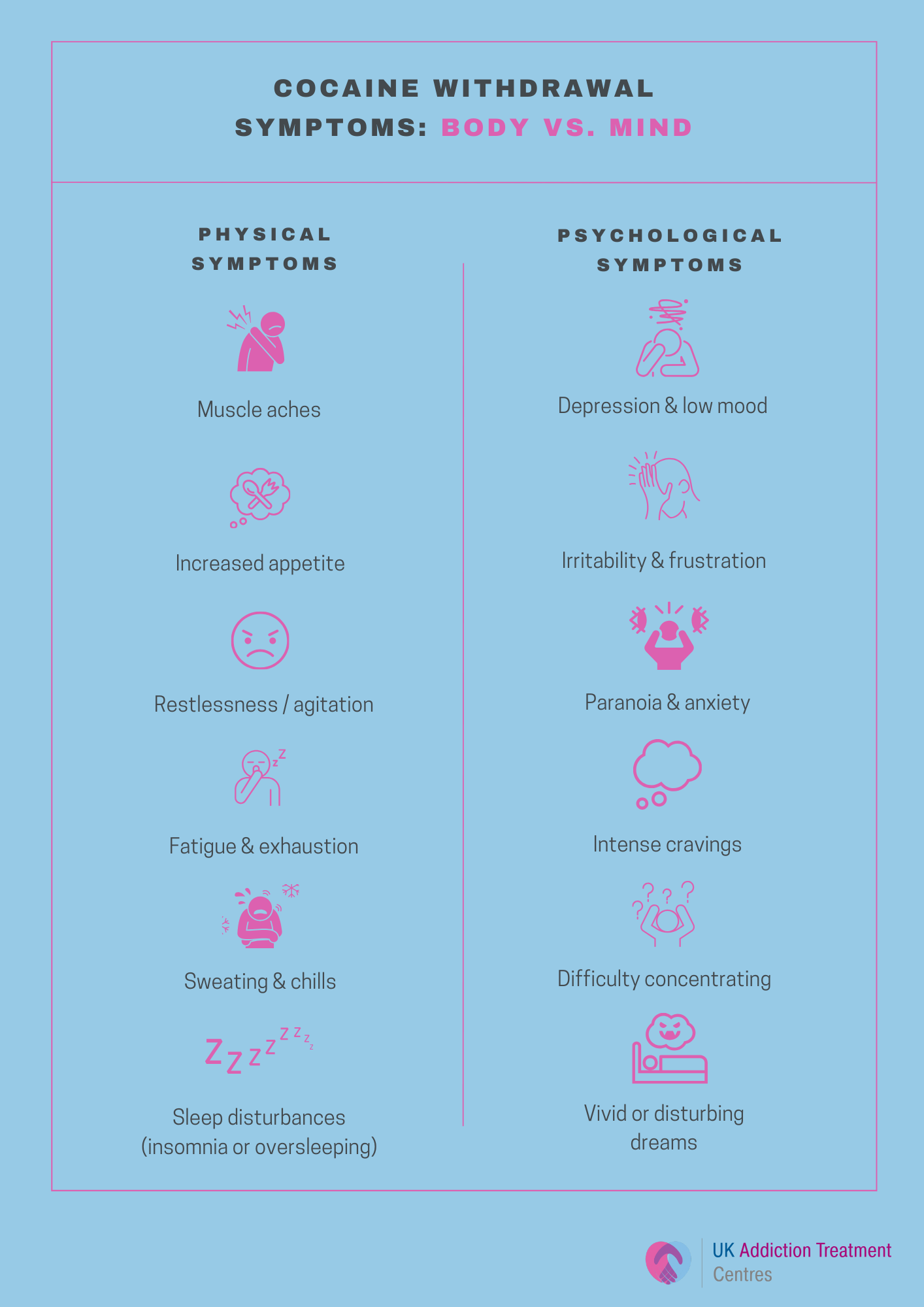
How long does it take to detox from cocaine?
Cocaine detox usually happens over a few weeks, though the worst of the withdrawal is often in the first 7 to 10 days. Everyone’s experience is slightly different, but here is a general idea of what the days might look like:
At a UKAT detox facility, our teams will support you through each stage and make sure you move straight into therapy once the hardest part is behind you.
What medication is used in cocaine detox?
There isn’t a single “detox pill” for cocaine, but doctors can use different medicines to ease the worst symptoms.
Cocaine withdrawal often brings on depression and agitation, but short-term antidepressants or calming medications may be prescribed to help. Insomnia and other problems sleeping are also very common, so mild sleeping pills may be given if you need them, so you can get the rest your body needs.
If cocaine withdrawal makes you feel very unsettled or paranoid, certain other medications can be used to calm things down. And as well as medicine, supplements and fluids may also be given to help your body recover from the strain of cocaine use.
Not everyone needs medication, but it’s always there if your symptoms call for it. At UKAT, our staff will accommodate any necessary medication needed and adjust your schedule as needed. They will also administer any other medications you need for other health conditions as long as they were properly prescribed to you before you enter detox.
Can you detox from cocaine at home?
It is possible to attempt cocaine detox at home, but it is rarely safe or successful. The cravings and mood crashes that come with withdrawal can quickly become too much, and many people relapse simply to make the symptoms stop. As explained above, cocaine withdrawal can sometimes trigger severe anxiety, paranoia or suicidal thoughts, which are very risky without medical support.
Some people try outpatient cocaine detox through the NHS, but this can mean managing symptoms alone once you leave the clinic. With inpatient cocaine detox, professionals can monitor your health, step in quickly if symptoms worsen and keep you away from triggers and temptations that make relapse more likely.
What comes after cocaine detox?
Getting through cocaine detox is a huge achievement, but it’s really just the first step. The next stage is therapy, where you’ll learn about the reasons behind your cocaine use, how addiction developed, and how to make the changes needed for lasting recovery.
At UKAT, every centre provides a full programme of therapies designed to help you heal on every level. These include one-to-one counselling where you can talk openly, group therapy to share experiences, trauma therapy to work through the past, family therapy to rebuild relationships and holistic activities to support your wellbeing. Each centre offers its own mix, so we recommend checking our centre pages or speaking with us directly to find the programme best suited to you.
And when rehab finishes, you don’t just get waved goodbye. Every UKAT centre offers ongoing aftercare, relapse prevention planning and a strong alumni community. This means you will still have support on tough days and people to cheer you on when things are going well.
Where can I receive inpatient cocaine detox?
Facing cocaine detox can feel intimidating, but you’re not alone. UKAT has already helped thousands of people make it through detox safely and start fresh in recovery. If you’re ready to take that step, or even if you’re just looking for reassurance, we’re here to talk. Whatever your starting point, our team will be there with you, offering care and encouragement every step of the way. Contact us today to find out how we can help you build a whole new life.
Frequently asked questions
There is also the risk of overdose if cocaine addicts return to the drug after a period of abstinence. Using the same amount of cocaine that was used before the detox began could cause a fatal overdose due to the individual’s tolerance for the drug dropping dramatically while not using.
(Click here to see works cited)
- Share of Adults in England and Wales Who Have Taken Cocaine, 2001-2024.” Statista, 7 July 2025, www.statista.com/statistics/1499686/cocaine-use-in-the-uk/?srsltid=AfmBOoqcr8aNmpqnKBZnTsXszbFHDjFSaIyMrWFvPLPxVHmmdg-k-UIN



